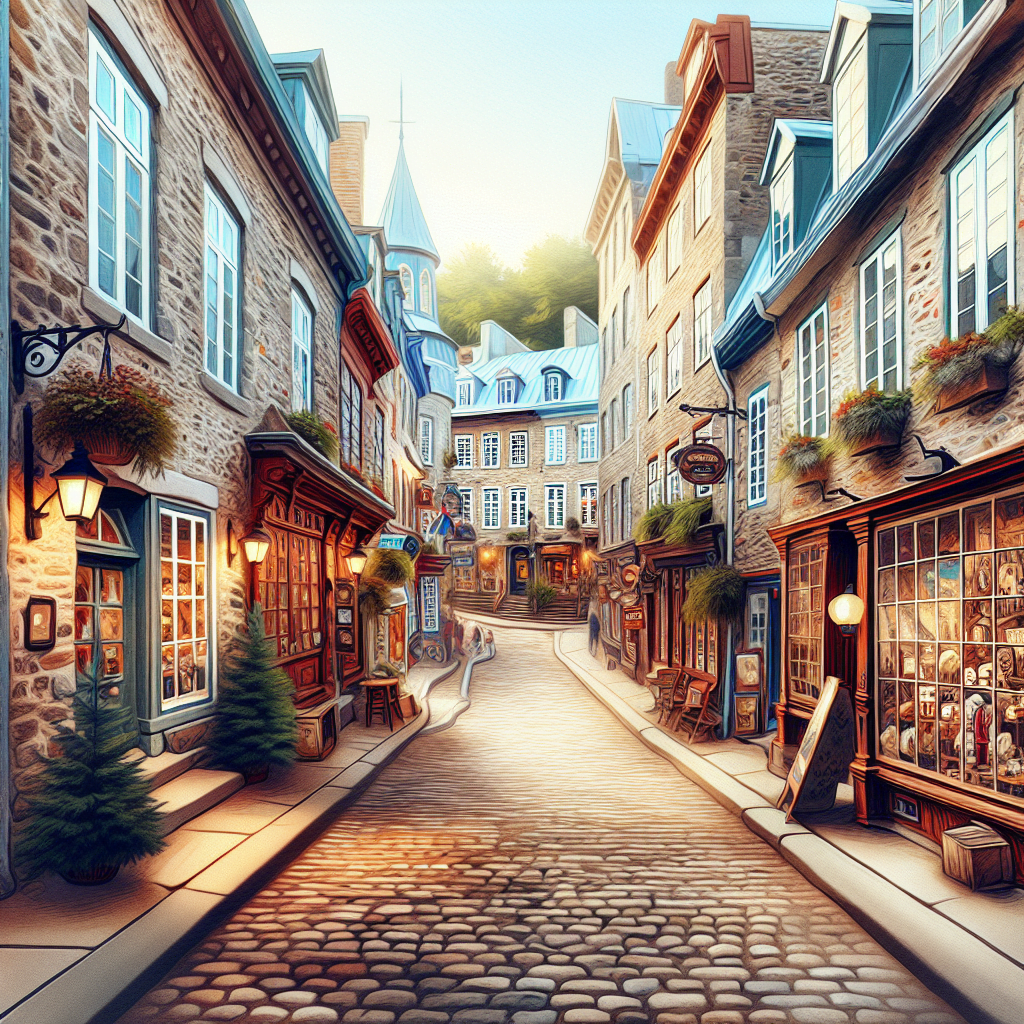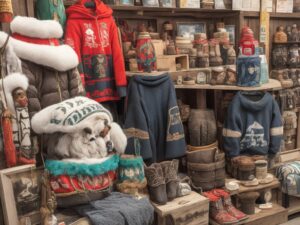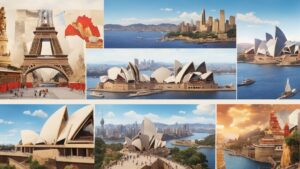Immerse yourself in the captivating world of Quebec City’s Francophone culture as we unveil the hidden gems and unique charm of “The French Connection ” and Quebec culture. From its rich history to its picturesque streets, this article will take you on a journey through the vibrant tapestry of Quebecois traditions, language, and alluring attractions that make this city a must-visit destination for culture enthusiasts. Whether you’re a seasoned traveler or a first-time visitor, prepare to be enchanted by the unparalleled beauty and warmth that the Francophone culture of Quebec City has to offer.
Table of Contents
ToggleThe History of Quebec City & Quebec Culture
Quebec City, the capital of the Canadian province of Quebec, has a rich and vibrant history that dates back centuries. From its origins as a small settlement to its colonization by the French and subsequent conquest by the British, Quebec City has been deeply influenced by both European powers. The city’s history is a tale of resilience and cultural blending, which has had a lasting impact on its Francophone culture and identity.
Origins and Settlement
The story of Quebec City begins with its indigenous inhabitants, who lived in the area for thousands of years before the arrival of European explorers. The Algonquin and Huron-Wendat tribes were among the first to call this land home, relying on the abundant natural resources provided by the St. Lawrence River. It was French explorer Samuel de Champlain who, in 1608, founded the city of Quebec and established a permanent settlement. This marked the beginning of French colonization in the region and laid the foundation for the city’s future as a major cultural and economic hub.
Colonization by the French
Under French rule, Quebec City thrived as a center of the fur trade, attracting both European settlers and indigenous peoples. The French presence in the city was characterized by the establishment of institutions such as the Catholic Church, which played a significant role in shaping the social and cultural fabric of Quebec City. The city’s architecture, with its European-inspired buildings and structures, reflects the influence of French culture and design. The French language also became an integral part of Quebec City’s identity and remained so even after the British conquest.
British Conquest and Impact on Francophone Culture
In 1759, during the Seven Years’ War, Quebec City fell to British forces led by General James Wolfe. The conquest marked a turning point in Quebec City’s history, as it brought an end to French rule and ushered in a new era under British control. Despite the change in political power, the French-speaking population in Quebec City remained resilient and continued to preserve their language and culture. The British administration introduced English as the official language of government and business, but the majority of the population, who were Francophone, maintained their distinct identity.
French Language in Quebec City
Importance of French Language
The French language is not only a means of communication in Quebec City but also a cornerstone of its cultural identity. French is the official language of Quebec, and the city takes great pride in its linguistic heritage. The preservation and promotion of the French language have been central to the efforts of both the government and the population at large. French is widely spoken in all aspects of daily life, from education and government to business and the arts. The language serves as a unifying force, strengthening the bond between Quebec City’s residents and their shared heritage.
Language Laws and Policies
In order to protect and promote the French language, Quebec City has implemented a series of language laws and policies. These measures aim to ensure the predominance of the French language in all areas of public life, from signage and advertising to workplace communication. The most notable of these laws is Bill 101, also known as the Charter of the French Language, which was passed in 1977. This landmark legislation mandates the use of French in various aspects of Quebec society and has had a significant impact on preserving the vitality of the French language in Quebec City.
French Dialects in Quebec City
While French is the dominant language in Quebec City, the city’s Francophone population is diverse, with various regional dialects and accents. Quebec French, often referred to as Joual, is a distinct dialect characterized by its unique vocabulary, pronunciation, and grammar. Joual is rooted in the working-class neighborhoods of Quebec City, and its usage reflects the city’s rich sociocultural history. In addition to Quebec French, the region is also influenced by Acadian French, spoken by the Acadian communities, and Creole, a mixture of French and other languages spoken by the Haitian diaspora. These dialects and linguistic variations contribute to the linguistic tapestry of Quebec City, adding to its vibrant and diverse Francophone culture.
Art and Culture in Quebec City
Influence of French Art and Literature
The French connection is not limited to language alone; it also extends to the world of art and culture. Quebec City has been deeply influenced by French art and literature throughout its history. From the classical paintings adorning the walls of galleries to the poetry and literature celebrated in bookstores, French artistic and literary traditions have shaped the cultural landscape of Quebec City. The city’s museums, such as the Musee du Quebec and the Musee de la Civilisation, showcase a wide range of French art, providing visitors with a deeper understanding of the French cultural heritage that has left an indelible mark on Quebec City.
Theatre and Performing Arts
The theatrical tradition in Quebec City is a vibrant and integral part of its cultural scene. The city boasts numerous theaters and performance spaces, including the historic Grand Theatre de Quebec, which has been showcasing a variety of performances since the 1930s. Quebec City is home to several professional theater companies, which produce a diverse repertoire of works ranging from classical French plays to contemporary pieces. The annual Quebec City Summer Festival, one of the largest music festivals in Canada, also features theatrical performances and showcases the city’s rich cultural heritage.
Local Festivals and Celebrations
Quebec City is known for its lively festivals and celebrations, which embrace and showcase its unique Francophone culture. One of the most famous events is the Quebec Winter Carnival, an annual winter extravaganza that brings together locals and visitors alike in a celebration of all things winter. The festival features parades, ice sculptures, sleigh rides, and traditional music and dance performances. Another popular event is the Festival d’ete de Quebec, a summer music festival that attracts renowned international artists and showcases Quebec’s thriving music scene. These festivals and celebrations are a testament to the importance of culture and tradition in Quebec City.
Culinary Delights of Quebec City
Traditional French Cuisine
The culinary scene in Quebec City is a delicious blend of French and Canadian influences. The city’s cuisine is rooted in traditional French cooking techniques and ingredients but has adapted to incorporate local flavors and ingredients. Classic French dishes, such as coq au vin and boeuf bourguignon, can be found on many menus throughout the city. The emphasis on fresh, locally sourced ingredients is also a hallmark of Quebec City’s culinary scene, with an abundance of farmers’ markets and artisanal food producers supporting the city’s commitment to sustainable and farm-to-table dining experiences.
Signature Quebecois Dishes
While French cuisine may dominate the culinary landscape, Quebec City is also known for its unique Quebecois dishes. Poutine, a mouthwatering combination of french fries, cheese curds, and gravy, is a quintessential Quebecois comfort food that has gained international fame. Tourtière, a meat pie made with ground pork, beef, or game, is another beloved Quebecois dish that is often enjoyed during the holiday season. Quebec City is also famous for its maple syrup production, and maple-based treats such as sugar pie and maple sugar candies are popular local delicacies.
Poutine and Other Unique Creations
Poutine, the iconic Quebecois dish, deserves a special mention for its cultural significance and popularity. In Quebec City, poutine can be found in countless variations, with creative toppings and flavors that go beyond the traditional recipe. From pulled pork to foie gras, Quebec City’s chefs have put their own unique spin on this beloved comfort food. Other culinary creations, such as tourtière poutine and poutine pizza, showcase the city’s culinary innovation and willingness to push the boundaries of traditional Quebecois cuisine. Exploring the diverse and delicious offerings of Quebec City’s culinary scene is a must-do for any visitor.
Exploring Quebec City’s Architecture
French-inspired Buildings and Structures
One of the defining features of Quebec City’s architectural landscape is its strong French influence. The city’s historic district, known as Old Quebec, is a UNESCO World Heritage site and home to some of the most iconic French-inspired buildings and structures in North America. The centuries-old stone buildings, narrow cobblestone streets, and fortified walls transport visitors back in time to the days of New France. The architectural styles range from French colonial to neoclassical, with each building telling a story of the city’s past and the cultural influences that have shaped it.
Historic Landmarks and Monuments
The city’s architectural heritage is further accentuated by its numerous historic landmarks and monuments. The most recognizable of these is the Chateau Frontenac, a grand hotel perched on a hill overlooking the St. Lawrence River. Its iconic turrets and imposing presence make it a symbol of Quebec City. The historic Plains of Abraham, where the famous battle between the French and British took place in 1759, is another must-see site. Other notable landmarks include the Basilique-Cathedrale Notre-Dame de Quebec, a stunning example of Gothic Revival architecture, and the Parliament Building, which showcases neoclassical design.
Distinctive Neighborhoods
Quebec City is not just a collection of historic sites; it is also a city with distinct neighborhoods, each with its own character and charm. The Old Port district, with its beautifully restored warehouses and bustling waterfront, is a hub of activity, featuring art galleries, shops, and restaurants. Quartier Petit-Champlain, one of the oldest commercial streets in North America, is renowned for its charming boutiques and cafes, as well as its picturesque narrow streets and historic architecture. Saint-Roch, a vibrant neighborhood just outside the walls of Old Quebec, is a hotspot for trendy restaurants, art galleries, and live music venues. Exploring the different neighborhoods of Quebec City allows visitors to experience the city’s unique atmosphere and discover its hidden gems.
Religious Heritage in Quebec City
Catholicism and Quebec City
Religion has played a significant role in the history and culture of Quebec City, with Catholicism being the dominant faith. The influence of Catholicism is evident in the city’s religious architecture, traditions, and festivals. Catholicism was brought to Quebec City by French settlers and missionaries, who built churches and cathedrals that still stand today. For centuries, religion has been an integral part of daily life, with churches serving as both places of worship and community gathering spaces.
Historic Churches and Cathedrals
Quebec City is home to several historic churches and cathedrals that showcase its religious heritage and architectural splendor. The Basilique-Cathedrale Notre-Dame de Quebec, located in the heart of Old Quebec, is a stunning example of Gothic Revival architecture. Its intricate stained glass windows, ornate woodwork, and grand organ are a testament to the city’s commitment to preserving its religious heritage. The Notre-Dame-des-Victoires, a small stone church dating back to the 17th century, is another must-visit site, offering a glimpse into Quebec City’s early history.
Religious Festivals and Traditions
Religious festivals and traditions are an important part of Quebec City’s cultural calendar. One of the most significant events is the Feast of Saint John the Baptist, the patron saint of Quebec, which is celebrated on June 24th. This holiday, known as Saint-Jean-Baptiste Day, is marked by parades, concerts, and fireworks, and is an opportunity for residents to express their pride in their Francophone and Catholic heritage. Other religious events, such as Christmas and Easter, are also celebrated with great fervor, with churches adorned with beautiful decorations and special religious services held throughout the city.
Music and Dance in Quebec City
Traditional French Music
Quebec City has a rich musical heritage, with traditional French music playing a central role in its cultural identity. Traditional folk music, characterized by lively fiddle tunes and foot-stomping rhythms, has deep roots in Quebec City. Influenced by Celtic and Acadian music, Quebecois traditional music has its own distinct sound and style. The use of instruments such as the fiddle, accordion, and spoons adds to the unique and vibrant atmosphere of Quebec City’s musical scene.
Influence of Celtic and Acadian cultures
The cultural melting pot that is Quebec City has been shaped by influences from not only France but also the Celtic and Acadian cultures. Celtic music, brought by the Scottish and Irish immigrants, has had a significant impact on Quebecois music, adding a Celtic flair to the traditional repertoire. Acadian music, with its lively rhythms and soulful melodies, has also found a home in Quebec City, thanks to the Acadian communities that settled in the region. This fusion of French, Celtic, and Acadian influences has created a diverse and vibrant music scene that celebrates the richness of Quebec City’s cultural heritage.
Québécois Folk Dancing
In addition to music, dance is an essential part of Quebec City’s cultural identity. Québécois folk dancing, with its energetic and lively movements, is a popular tradition that has been passed down through generations. Traditional dances such as the jig and quadrille are often performed at festivals and social gatherings, inviting residents and visitors alike to join in the fun. These dances not only provide entertainment but also serve as a means of preserving and promoting the cultural traditions of Quebec City.
Sports and Recreation in Quebec City
Ice Hockey and its Popularity
Quebec City is known for its fervent love of ice hockey, a sport deeply embedded in its cultural fabric. Ice hockey has a long and storied history in Quebec City, with passionate fans and a rich tradition of producing talented players. The city is home to the Quebec Remparts, a major junior hockey team, and has a strong amateur hockey scene. The Pepsi Coliseum, a historic indoor arena, is a popular venue for hockey games and often hosts international competitions. For residents and visitors alike, attending a hockey game and witnessing the enthusiasm of the crowd is an unforgettable experience.
Winter Sports and Activities
Quebec City’s unique climate and landscape make it an ideal destination for winter sports and activities. The city is a gateway to the Laurentian Mountains, which offer a wide range of winter recreational opportunities such as skiing, snowboarding, and snowshoeing. The nearby Mont-Sainte-Anne and Le Massif ski resorts attract outdoor enthusiasts from around the world with their pristine slopes and breathtaking views. Locals and visitors alike can also enjoy ice skating on the frozen St. Lawrence River or in one of the city’s many outdoor rinks. Embracing the winter season and participating in these activities is a cherished pastime for the people of Quebec City.
Outdoor Adventures in the Surrounding Area
Beyond winter sports, Quebec City’s surrounding area offers a wealth of outdoor adventures throughout the year. The Parc de la Chute-Montmorency, located just outside of the city, features an impressive waterfall that is higher than Niagara Falls. Visitors can take in the breathtaking views from various observation points or enjoy a thrilling zip line ride across the falls. The Parc National de la Jacques-Cartier, a vast wilderness area, is a haven for hiking, canoeing, and wildlife spotting. Exploring the natural beauty that surrounds Quebec City allows visitors to connect with nature and experience the region’s outdoor wonders.
Education and Language Immersion Programs
Francophone Education System
Education is a cornerstone of Quebec City’s commitment to preserving and promoting its Francophone culture. The province of Quebec has its own unique education system, which places a strong emphasis on the French language. The majority of schools in Quebec City are Francophone, with French being the primary language of instruction. This ensures that Francophone students have the opportunity to immerse themselves in the language and develop a strong sense of cultural identity. The education system also promotes the study of Quebec history and literature, helping to foster a deeper understanding and appreciation of Quebec City’s rich heritage.
Language Immersion Opportunities
For those seeking to further immerse themselves in the French language and Francophone culture, Quebec City offers a variety of language immersion programs. These programs are designed for people of all ages and language abilities, from beginners to advanced speakers. Language schools and institutions in Quebec City provide a supportive environment where students can refine their language skills through intensive classes, cultural activities, and social interactions with native speakers. Language immersion programs not only enhance language proficiency but also offer a unique opportunity to experience the traditions and customs of Quebec City firsthand.
Promoting the Francophone Culture
In addition to education and language immersion, Quebec City is dedicated to promoting its Francophone culture through various initiatives. Cultural organizations, such as Quebec City’s Maison de la Litterature and Le Lieu Unique, play a crucial role in showcasing the work of French-speaking artists and writers. These institutions host literary events, exhibits, and performances that celebrate the Francophone culture and provide a platform for local and international artists. By supporting and promoting the arts, Quebec City ensures the continued vitality of its Francophone heritage and fosters a sense of community among its residents.
Preserving and Promoting Francophone Heritage
Organizations and Initiatives
Preserving and promoting the Francophone heritage of Quebec City is a collective effort undertaken by various organizations and initiatives. The Office québécois de la langue française (OQLF) is the government agency responsible for enforcing language laws and promoting the French language. The agency provides resources and support to businesses, educational institutions, and individuals to help them comply with language requirements and maintain the use of French. Cultural organizations, such as the Quebec City Francophone Cultural Alliance, also play a vital role in preserving and promoting Francophone heritage by organizing events, advocating for language rights, and supporting artists and performers.
Efforts to Preserve the French Language
Since the passage of Bill 101 in 1977, Quebec City has implemented various measures to promote the use of French and ensure its preservation. These include language requirements for education, government services, and workplaces, as well as the strict regulation of signage and advertising. The aim of these efforts is to protect the French language from being overshadowed by English and to maintain the predominance of French in the public sphere. Despite some controversies and ongoing debates, these efforts have had a lasting impact on the preservation and vitality of the French language in Quebec City.
Promoting Cultural Exchange
While Quebec City is proud of its French heritage, it also recognizes the value of cultural exchange and diversity. The city actively promotes and welcomes international artists, performers, and students to contribute to its vibrant cultural scene. Festivals such as the Festival d’ete de Quebec and the Quebec Winter Carnival showcase not only local talent but also feature international artists, fostering cross-cultural connections and broadening the perspective of Quebec City’s residents and visitors. Quebec City’s commitment to promoting cultural exchange allows it to thrive as a global hub of Francophone culture while embracing the rich tapestry of diversity that enhances the city’s identity.
In conclusion, Quebec City’s history and culture are deeply intertwined with its Francophone heritage. From its origins as a small French settlement to its status as the capital of Quebec, the city has been shaped by centuries of French influence. Through a commitment to preserving the French language, promoting the arts and culture, and embracing the diversity of its residents, Quebec City continues to celebrate and share its unique Francophone identity with the world. Visitors to Quebec City are invited to immerse themselves in this enchanting blend of history, language, and culture, experiencing the warmth and charm of the French connection that makes this city truly one-of-a-kind.





